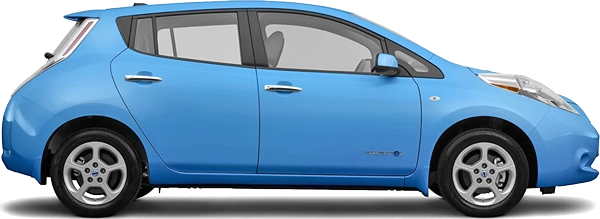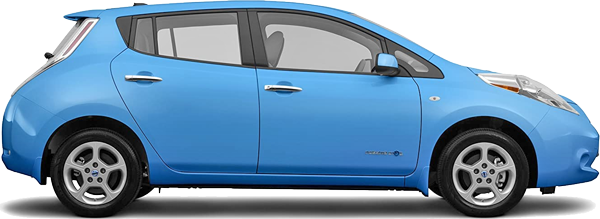The Comparative Analysis :
Hyundai i30 1.0 T-GDI (17 - 18) vs. Nissan Leaf 24 kWh (12 - 13)
€ 19,900

€ 34,000

€ 19,900
Base Price ⓘBase price of a new vehicle with standard equipment in Germany at market launch.
€ 34,000
ⓘBase price of a new vehicle with standard equipment in Germany at market launch. Price Info
Vehicle Dimensions
The dimensions of these vehicles differ considerably. The Hyundai i30 1.0 T-GDI is 10.5 cm shorter, 2.5 cm wider and 9 cm lower than the Nissan Leaf (24 kWh).
Hyundai i30 1.0 T-GDI
Nissan Leaf (24 kWh)
1455
1795
2050
1545
1770
1970
1795 mm
Width
1770 mm
2050 mm
Width Incl. Mirrors
1970 mm
1455 mm
Height
1545 mm
2650
4340
2690
4445
4340 mm
Length
4445 mm
2650 mm
Wheelbase
2690 mm
Vehicle Weight
Hyundai i30 1.0 T-GDI
Nissan Leaf (24 kWh)
1269 kg
Kerb Weight
1642 kg
1800 kg
Gross Vehicle
Weight
Weight
1965 kg

Weight Difference:
373 kg
22.72 %

General
Hyundai i30 1.0 T-GDI
Nissan Leaf (24 kWh)
PDE
Generation
ZE0
Hatchback
Car Body Style
Hatchback
Unleaded (95 RON)
Fuel Type
Electricity

Front-wheel drive
Drive
Front-wheel drive

6-speed manual transmission
Transmission
1-speed automatic transmission
Engine
Hyundai i30 1.0 T-GDI
Nissan Leaf (24 kWh)
Straight-three petrol engine with turbocharger
Engine Type
Electrically excited synchronous motor
4
Valves
0
3
Cylinders
0
998 CC
Engine Capacity
0 CC
118 bhp
at 6000 rpm
Power
108 bhp
at 0 rpm
Hyundai i30 1.0 T-GDI
118 bhp
108 bhp
Nissan Leaf (24 kWh)
171 NM
at 1500 rpm
Max. Torque
280 NM
at 0 rpm
Hyundai i30 1.0 T-GDI
171 NM
280 NM
Nissan Leaf (24 kWh)
Performance
Hyundai i30 1.0 T-GDI
Nissan Leaf (24 kWh)
118 mph
Maximum Speed
90 mph
11.1 sec
Acceleration 0 to 62 mph
11.9 sec
62 mph
62
mph
mph
154 m
0.000 sec

Hyundai i30 1.0 T-GDI
62 mph
62
mph
mph
165 m
0.000 sec

Nissan Leaf (24 kWh)
▶ REPLAY
10.75 kg/bhp
Weight-to-Power Ratio
15.2 kg/bhp
Hyundai i30 1.0 T-GDI
10.75 kg/bhp
15.2 kg/bhp
Nissan Leaf (24 kWh)
Fuel Economy / Emissions
Hyundai i30 1.0 T-GDI
Nissan Leaf (24 kWh)
Fuel Economy
58 mpg
combined ✽ per 100 miles
28 kWh✽
( 144 MPGe ⓘ Miles per gallon petrol equivalent (MPGe) is a measure of the average distance traveled per unit of energy consumed. MPGe, specified in miles per imperial gallon (~4.546 litres), is used to compare the energy consumption of vehicles that use different energy sources.)
Hyundai i30 1.0 T-GDI
58 mpg
144 MPGe
Nissan Leaf (24 kWh)
50 mpg
city
No data
64 mpg
motorway
No data
50 L
Fuel Tank Capacity
24 kWh
634 mi
Range
86 mi
Hyundai i30 1.0 T-GDI
634 mi
86 mi
Nissan Leaf (24 kWh)
Environmental Impact
92.9 kWh
Total Energy Consumption
per 100 miles ⓘThe total energy consumption per 100 miles is the amount of energy consumed by a vehicle when burning fuel or using electricity per 100 miles (final energy), and the energy required to produce the appropriate amount of fuel or electricity (primary energy).
per 100 miles ⓘThe total energy consumption per 100 miles is the amount of energy consumed by a vehicle when burning fuel or using electricity per 100 miles (final energy), and the energy required to produce the appropriate amount of fuel or electricity (primary energy).
56.2 kWh
Hyundai i30 1.0 T-GDI
92.9 kWh
56.2 kWh
Nissan Leaf (24 kWh)
Euro 6b (NEFZ)
Emission Standard
Elektrofahrzeug
112 g/km (NEFZ)
CO2 Emissions
0 g/km (NEFZ)
Practical Convenience
Hyundai i30 1.0 T-GDI
Nissan Leaf (24 kWh)
5
Doors
5
5
No. of Seats
5
531 kg
Maximum Payload
323 kg
395 L
Boot Capacity
330 L








1301 L
Boot Capacity (Seats Down)
680 L
















